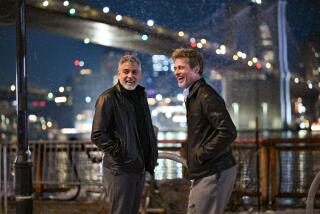Julianne Moore on ‘Wonderstruck,’ her approach to beauty and being directed by George Clooney
It’s been a busy week for Julianne Moore in Cannes, France, both as a L’Oréal Paris ambassador and to support the premiere of Todd Haynes’ latest flick, “Wonderstruck,” one of 19 titles in competition at the annual film festival.
An adaptation of the young adult novel of the same name by Brian Selznick — whose “The Invention of Hugo Cabret” was filmed as “Hugo” by Martin Scorsese — the movie, set in two periods, is billed as a tale of two lost hearing-impaired children finding each other. Here, the Oscar-winning actress talks to WWD about the experience of making the movie, being directed by George Clooney and being a bookworm.
WWD: Tell us about “Wonderstruck.”
Julianne Moore: It takes places both in the Twenties and the Seventies, and I play a part in both films. Stylistically, it was very interesting because the entire first part of the movie, which is set in the Twenties, is a silent film in black-and-white. It was interesting to explore in terms of research and looking at silent film.
The interesting thing is that in film you’re always looking at what’s human, what’s universal and oddly, by putting a genre or style on something, it sometimes allows you to focus on what you’re doing in a different kind of way, to explore behavior. So that’s always fascinating to me.
Sandy Powell did the costumes. She tells a story with the clothes. She’s very specific, and when you collaborate with her, it’s another element of creating a character.
WWD: You also star in “Suburbicon,” directed by George Clooney. What is unique about his approach to directing?
J.M.: He’s great. He’s incredibly prepared and he attracts a tremendously talented crew, which says a lot for him personally and professionally. You know, when someone has that caliber of talent around them, that they are gifted themselves, and well-liked and really capable.
It’s based on a script that the Coen brothers wrote years ago that George found, and they agreed to have him to direct it. It’s me, Matt Damon and Oscar Isaac.
WWD: Can you share any of the storyline?
J.M.: Matt Damon and I play a couple that lives in a Levittown, the name for the suburban communities in the United States that were built by William Levitt after World War II, with people needing affordable housing very quick. There was one outside of Pennsylvania, there was one in Long Island….So this is based in a community like that, and it’s a primarily white community. And in it an African-American family moves in and everyone starts blaming all the trouble on them. In the meantime, there’s a lot of stuff that’s happening in our household that Damon and I share, there’s some stuff happening there and they’re hiding in the chaos.
WWD: At this stage of your career, what draws you to working on a film?
J.M.: I like stories about people. I like things that are human and different. I want to be as engaged in my work as I am in reading a book. I want to be electrified by the films I do.
WWD: You starred in Tom Ford’s “A Single Man.” Do you still keep in touch?
J.M.: Tom is a close friend, so yes. We were in Los Angeles together just a couple of weeks ago.
WWD: Being a L’Oréal Paris ambassador, has your approach to beauty changed over the years?
J.M.: One of the things that I love about L’Oréal is that it’s accessible and aspirational. Beauty doesn’t have to be a mystery, and it can be available to everybody. But it’s also about accessing what is most innately human, what we think is attractive. You realize, even with makeup, we like pink cheeks because we like people who look excited and flushed. We like lips that have moisture in them because it makes you look healthy. We like shiny hair, all of those things. That’s the connection to beauty and humanity.
WWD: For your roles, where do you draw inspiration from? Are you a devourer of films, or do you prefer to look elsewhere?
J.M.: I read a lot, I always read. I like to be inside a story. When I started acting, even in high school, it sort of felt like that’s as close as you can get to being inside a book, and I feel that way even with movies more so, because you’ve kind of created this imaginary world, and everybody is colluding to create it.
I’m reading “The Underground Railroad,” which is pretty sad.
ALSO:
Cannes 2017: Susan Sarandon talks film, porn and politics
Cannes 2017: Cara Delevingne talks ice cream and new Magnum x Moschino short film by Jeremy Scott
Wolk Morais’ strong shoulders and soft touches pay gender-bending homage to ‘40s Hollywood
More to Read
Only good movies
Get the Indie Focus newsletter, Mark Olsen's weekly guide to the world of cinema.
You may occasionally receive promotional content from the Los Angeles Times.











